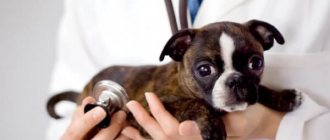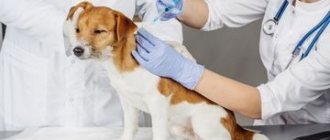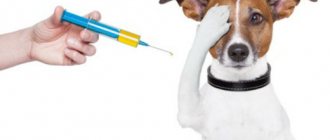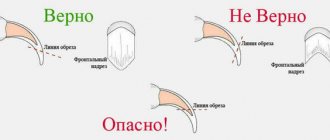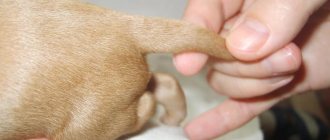The question of why dogs need vaccinations causes the most heated debate among dog breeders. Some categorically refuse to vaccinate their pets, while others, on the contrary, zealously defend the need for this preventive procedure. Owners of Russian toy terriers were also not spared from this discussion. When asked whether or not to vaccinate a dog, the answer is clear: do it.
Why vaccinate your Russian Toy Terrier?
All kinds of viruses and bacteria surround both people and pets. They are everywhere - in the air, food, water, soil, and in the bodies of sick animals. The situation in our country is aggravated by the large number of stray dogs and the low level of vaccination of domestic dogs.
As a result, the risk of contracting dangerous diseases increases significantly. After all, an inquisitive toy terrier is unlikely to resist sniffing another dog during a walk or trying the “delicacy” he finds on his teeth. Even if you exclude your dog from contact with other dogs, there is always a risk of infection, for example, through the dirt that remains on your shoes after a walk.
At what age does a puppy get its first vaccination?
The first vaccines can be given by both the breeder and the owner (in a veterinary clinic). However, the age of vaccination depends on the conditions in which the puppy lives in the first months of life.
Newborn dogs receive their first antibodies from their mother's milk. Antibody levels will decrease and reach a minimum at an average of 12 weeks. Veterinarians do not recommend giving puppies their first vaccination immediately after birth, since the transmitted antibodies neutralize the viruses that have entered the body, and the procedure will have to be repeated.
In addition, the time when you need to get the vaccine depends on your living conditions. If the puppy should be with new owners at 1–1.5 months or he is surrounded by a large number of other dogs, then the first vaccination for the puppy can be given as early as 6 and 12 weeks. If the animal leaves its mother at 2 months or older, then the first vaccine is given at 8 weeks, and the second vaccination for the puppy is given at 12.
You should not disrupt the vaccination schedule, because antibodies may not form, which means you will have to repeat the procedure.
What diseases are dogs vaccinated against?
All vaccines are divided into mandatory and optional. Mandatory vaccinations include:
- rabies is a deadly disease for both four-legged pets and humans. Once clinical symptoms appear, there is no effective therapy;
- Bordetellosis is an infectious disease of domestic animals. Which fails in inflammation of the bronchi, trachea and lungs;
- Canine distemper is a highly contagious and widespread disease with a high mortality rate, especially among young dogs;
- viral hepatitis - the disease is dangerous for young dogs. Potentially allergenic serums are used for therapy;
- adenoviral infections are a widespread disease, the greatest risk for four-legged pets is acute forms;
- parvovirus enteritis is a highly contagious disease with a high risk of death. The causative virus of parvovirus is highly resistant to physical and chemical influences and remains active in the external environment for several months;
- Leptospirosis is a widespread disease with a high risk of death. Leptospirosis affects not only pets, but also humans.
Additional vaccinations are given from:
- piroplasmora is a common animal disease in Europe and Siberia. The disease develops rapidly as a result of a dog being bitten by a forest tick;
- Lyme disease (tick-borne berriliosis) is a common disease caused by ticks. Berriliosis is potentially dangerous to humans;
- fungal diseases - contagious and common diseases for both animals and people;
- canine parainfluenza - the disease occurs quite often, is transmitted by airborne droplets, and carries the greatest risk for puppies;
- Coronavirus enteritis is a highly contagious disease. A dog can get enteritis from sniffing the feces of a sick animal or from direct contact.
Why is polio dangerous?
Most infections (>95%) are asymptomatic, but antibodies are produced. If there are signs of illness, there are different pictures of the disease:
· Abortive polio: inflammation of the gastrointestinal tract (gastroenteritis), fever, nausea, sore throat, muscle pain and headaches without central nervous system involvement.
· Non-paralytic poliomyelitis (aseptic meningitis): inflammation of the meninges without paralysis.
· Paralytic polio (1 in 200 infections) with typical symptoms of paralysis: independent breathing may become impossible and lifelong use of mechanical ventilation may be required. Paralysis can also lead to death.
Even decades after infection, post-poliotic syndrome may occur. There is no cure for polio. Only symptomatic therapy is prescribed to eliminate discomfort.
What vaccinations does a terrier need?
The Russian Toy Terrier first of all needs mandatory vaccinations. Beginning dog breeders often wonder at what age terrier vaccinations are required. Approximate puppy vaccination schedule:
- at 3 weeks, vaccination against a group of infections conventionally called “kennel cough” - borderellosis and canine parainfluenza;
- at 4 weeks from canine distemper and parvovirus enteritis;
- at 8-10 weeks from canine distemper, viral hepatitis, parvovirus enteritis, leptospirosis;
- 11-13 weeks (but not earlier than 3 weeks after the previous procedure) again from canine distemper, viral hepatitis, parovirus enteritis, leptospirosis and the first time from rabies;
- annually against canine distemper, viral hepatitis, parvovirus enteritis, leptospirosis and rabies.
For additional vaccinations, the veterinarian develops an individual vaccination plan based on the health status of the four-legged pet.
The first vaccination for toy terrier puppies, as well as subsequent ones, are given in the kennel. Therefore, when buying a Russian Toy puppy, make sure that the veterinary passport contains notes on all mandatory vaccinations.
Preparing for grafting
Only healthy dogs can be vaccinated. It is recommended to avoid walks for 2-3 hours, stressful situations before vaccination, leave the daily routine and diet unchanged. One day before the procedure, measure the terrier's temperature. On the day of vaccination, it is forbidden to feed your pet. Let's just drink water.
Deworming should be carried out 7-10 days before vaccination.
Vaccination contraindications:
- Fever;
- Low body weight;
- Developmental delay;
- Exhaustion;
- Any diseases;
- Worm infestation;
- Reduced immunity;
- Recently suffered serious illnesses.
How much does it cost to vaccinate a toy terrier?
The cost of the procedure depends on several factors. First, the brand of the vaccine manufacturer. Secondly, the location of the manipulation: at home or in the veterinary clinic.
Average cost of vaccinations for a Russian Toy Terrier:
- vaccination with a polyvalent vaccine for dogs (puppies) domestic Biovac, Multakan-4, -6, -8 - at home 1100 rubles, at the veterinary clinic 600 rubles;
- vaccination with polyvalent vaccine for dogs (puppies) imported Nobivak, Vanguard, Duramun, Eurikan - at home 1400 rubles, at the veterinary clinic 900 rubles;
- registration of a veterinary passport - 150 rubles.
Rules for vaccination of the Russian Toy Terrier
There are several rules related to vaccination that every toy terrier owner must adhere to:
- Before immunity appears, it is necessary to minimize the likelihood of infection of your four-legged pet. To do this, it is necessary to exclude contacts with foreign animals and walks on the street, strictly observe the rules of hygiene, and ensure that the puppies do not come into contact with shoes and outerwear;
- 2 weeks before vaccination it is necessary to carry out deworming. This must be done because parasites reduce the protective functions of the dog’s body. You also need to check the toy terrier for the presence of external parasites - fleas and ticks. Within 2-3 days before the scheduled vaccination, measure the body temperature of your ward and carefully monitor his health. The temperature should be between 37.5°-39°C. Vaccinations are given only to healthy pets. If your Russian Toy Terrier gets sick, notify your veterinarian, he will create an individual vaccination schedule;
- Monitor the condition and behavior of your ward for several hours after vaccination. If your toy terrier experiences shortness of breath, excessive salivation, or an allergic reaction after vaccination, contact your veterinarian immediately. This may indicate an allergy to the vaccine or individual intolerance to the vaccine. After the procedure, protect your Russian Toy Terrier from all kinds of stressful situations: travel on public transport, contact with other animals, change of diet, tense environment at home, overheating or hypothermia, bathing and other hygiene procedures, physical activity.
The toy terrier will finally develop immunity to the disease 2 weeks after vaccination. During this period, be as attentive as possible to your four-legged friend and his state of health. If you notice changes in your Russian Toy Terrier's behavior or alarming symptoms, notify your veterinarian immediately.
Vaccination for those who have recovered from coronavirus
Table of contents
- Do those who have recovered from coronavirus need vaccination?
- When should those who have recovered from coronavirus be vaccinated?
- Do people who have recovered from coronavirus need two-dose vaccination?
- Advantages of contacting MEDSI
The immunity of those people who have had coronavirus lasts on average from 3 to 9 months.
After this period, re-infection is possible. Vaccination can protect a person from it. But experts and ordinary people constantly argue about whether it is required.
Let's figure it out! Do I need to get vaccinated (get vaccinated) if I have had coronavirus? When should it be done? Where to go to undergo the procedure?
Do those who have recovered from coronavirus need vaccination?
WHO (World Health Organization) recommends that everyone be immunized.
And it doesn’t matter whether a person was infected or not. The US CDC (Centers for Disease Control and Prevention) shares the same opinion. Vaccination should be delayed for 3 months only after treatment with monoclonal antibodies or if there is a history of multisystem inflammatory syndrome. The Minister of Health of the Russian Federation is also confident that vaccination of those who have recovered from coronavirus is mandatory.
This is due to the fact that, according to Russian and international studies, the immune response in people who have had an infection lasts only about six months after it. Then the protection gradually weakens. Immunization makes it possible to increase the effectiveness of the fight against coronavirus infection (including its new strains).
When should those who have recovered from coronavirus be vaccinated?
A person who has been infected usually receives protection from re-infection for six months. This point of view is currently shared by both the Ministry of Health and Rospotrebnadzor of the Russian Federation, and the WHO. That is why vaccination is possible already 6 months after recovery.
Do people who have recovered from coronavirus need two-dose vaccination?
In many countries around the world, those who have recovered are recommended to receive one dose of the vaccine.
In Russia, 2 doses of Sputnik V or CoviVac are administered. Meanwhile, Argentine scientists who compared antibody levels after vaccinations concluded that 1 dose is sufficient. This is due to the fact that in those who have recovered from the disease, the level of antibodies after the administration of the vaccine is higher (4.6 times) than in those who were not infected.
Advantages of contacting MEDSI
- Experienced specialists.
Vaccination of people who have recovered from coronavirus is carried out by paramedical personnel (nurses) with the necessary knowledge and skills - Mandatory preliminary consultation with a doctor.
He will talk about vaccination against coronavirus for those who have recovered from Covid, answer the question of whether you should be vaccinated (if you have certain diseases), report on the indications and identify contraindications (if any) - Possibility for administration of two drugs.
Immunization can be carried out with the Sputnik V, Sputnik Light and Kovivak vaccines. - Diagnostic capabilities.
Before vaccination, you can perform a rapid test for the coronavirus antigen (smear) or a PCR test to detect the RNA of the virus (smear), as well as a study of the level of IgG antibodies to the spike protein of the SARs CoV-2 virus - Transfer of vaccination data to the government services portal.
Our specialists ensure data transfer to a special register to receive a QR code - Immunization preparation program.
It includes an examination by a doctor before the administration of each component of the vaccine, a rapid test for COVID-19, vaccination (1-2 doses) and two telemedicine consultations in the SmartMed application - Comfortable conditions for the procedure.
Vaccination is carried out without queues or long waits, on a convenient day. To undergo the procedure, each patient can choose the nearest clinic
If you want to clarify the specifics of coronavirus vaccination for those who have had Covid or sign up for vaccination, call +7 (495) 7-800-500. Our specialist will answer all questions. You can also register for a clinic using the SmartMed application.
How to worm a toy terrier before vaccination
Deworming plays an important role in dog vaccination. Most often, veterinarians recommend using Prazitel for these purposes, since this drug is active against all types of worms.
The drug should be given in the morning on an empty stomach before meals. Prazitel for puppies and small breed dogs is available in tablets and suspensions. For Russian Toy Terriers, a suspension is better. Firstly, in this form the drug is easier to give to the dog, and secondly, it is easier to calculate the dose for the dog.
Dosage of Parasite in suspension for puppies and small breed dogs:
- 1 ml per 1 kg of dog weight.
If your Russian Toy Terrier weighs less than a kilogram, then the dose should be reduced accordingly. For example, if a dog weighs 800 grams, then its dose of Parasite is 0.8 ml. Please note that the drug should not be given to puppies under two weeks of age.
To give your Russian Toy Terrier medicine, draw the required amount of suspension into a syringe (for small doses, a 1-cc or insulin syringe is suitable, just don’t forget to remove the needle). Then, holding your pet's head, part his lips from the side and gently insert the syringe nozzle, then gradually inject the medicine.
How to prepare your pet for the first vaccination?
When vaccinating a dog, breed, weight and size do not matter.
14 days before vaccination it is necessary to treat your pet for worms. Deworming is extremely important and owners should monitor this closely. Don't forget about other dangers, such as ticks. There are special anti-tick collars - the use of such products in the warm season will be a good help in the fight against pet diseases.
It is important that the puppy is healthy at the time of the procedure. Therefore, it is better to do the vaccination in a veterinary clinic so that the doctor can conduct an examination and confirm the good condition of the animal. In addition, do not forget that official vaccinations are given only in veterinary clinics, and a veterinary passport is also issued there, without which transporting an animal abroad will be impossible. Do not vaccinate yourself - you can seriously harm your pet.
Complications after vaccination
In some cases, after vaccination, the Russian Toy Terrier may experience drowsiness, a slight increase in body temperature, and lack of appetite. This reaction of the four-legged friend’s body to the vaccine is considered normal and the symptoms disappear within a few days.
In rare cases, toy terriers experience complications after vaccination:
- redness and itching at the vaccination site;
- severe weakness;
- increased salivation;
- pallor, and eventually blueness of the mucous membranes;
- dyspnea;
- loss of consciousness;
- anaphylactic shock.
If you notice any of the above symptoms in your Russian Toy Terrier, contact your veterinarian immediately. To suppress an allergic reaction, give your dog Suprastin, Claritin or Tavegil.
Whether or not to vaccinate a dog is the business and responsibility of every dog owner. But remember that vaccination of puppies and adult Russian Toy Terriers is the only effective preventive measure against deadly diseases.
General health issues for your toy.
“When should you start getting acquainted with the veterinarian who will monitor your toy, and how often should you visit him?”
Answer: You should start meeting with a veterinarian when you are planning to adopt a Russian Toy Terrier puppy. The veterinarian will tell you how to prepare for the arrival of a small dog, what supplies to stock up on, provide instructions on strategies to ensure your pet’s health, and help you choose food. After the puppy arrives, at first you will visit the veterinarian quite often, and later you can limit yourself to visiting the doctor once a year. When meeting a veterinarian, be sure to write down the phone number where you can contact him, discuss the working conditions and first aid. Let this phone always be at hand, so that at the right time you don’t have to waste extra seconds looking for it.
“How to determine an emergency when you definitely need to contact a veterinarian?”
Answer: Emergency cases when your pet cannot do without consulting a veterinarian include:
- Insect bites
- Your Toy Terrier's Breathing Difficulty
- Foreign body entering the respiratory tract of a small dog
- Broken bones, profusely bleeding wounds or severe injuries
- Paralysis
- Severe poisoning or frequent vomiting
- Severe diarrhea
In these cases, you should immediately go to a veterinary hospital, having previously called the doctor so that the latter can plan what actions may be required of him and be on the spot.
“What products should you have in your home veterinary medicine cabinet in order to help your Russian Toy if necessary?”
Answer: Your home veterinary first aid kit should contain the following medications:
- Valocordin, cordiamine, sulfocamphocaine in ampoules, ammonia, calcium gluconate in ampoules.
- Novocaine 0.5%, petroleum jelly, activated carbon, 0.5% glucose, sachets of rehydron, suprastin, tavegil, dry chamomile, oak bark, flax hay, potassium permanganate.
- Syntomycin emulsion, iodine, brilliant green, furatsilin, hydrogen peroxide.
- Analgin, no-spa, diphenhydramine, cycloferon.
- Thermometer, bandage, cotton wool, adhesive plasters, pipette with a blunt end, disposable syringes with different numbers of milliliters, a small syringe.
- Immunofan, fosprenil, traumeel.
- Anthelmintic drugs. It is best to discuss the choice of drug with your veterinarian.
- Products against fleas, ticks, mosquitoes. When choosing a drug, you need to consult with a veterinarian, who will select for a small dog exactly the drug that will correspond to the epidemiological situation in the area.
You can either create a first aid kit yourself or buy a ready-made one. In any case, it is best to consult with a veterinarian, who will tell you which medications are best to purchase and how to use this or that medicine.
“How should you care for a sick toy? Are there any general rules that will help alleviate the dog’s condition?”
Answer: First of all, a place for a sick dog should be chosen away from drafts and excessive noise. The room should be ventilated more often and damp cleaning should be carried out daily. Medicines can be given with food. The food of a sick dog should be easily digestible, nutritious and high in calories. It is better to feed more often, but in small portions. It is important to maintain hygiene of the Toy’s body and carefully monitor the ears, eyes (they are washed from the outer corner to the inner one using cotton swabs), the oral cavity (some diseases cause complications on the teeth, so you need to carefully remove food debris from the oral cavity) and nose ( Using cotton wicks and Vaseline, remove crusts from the nose) of the Russian Toy.


